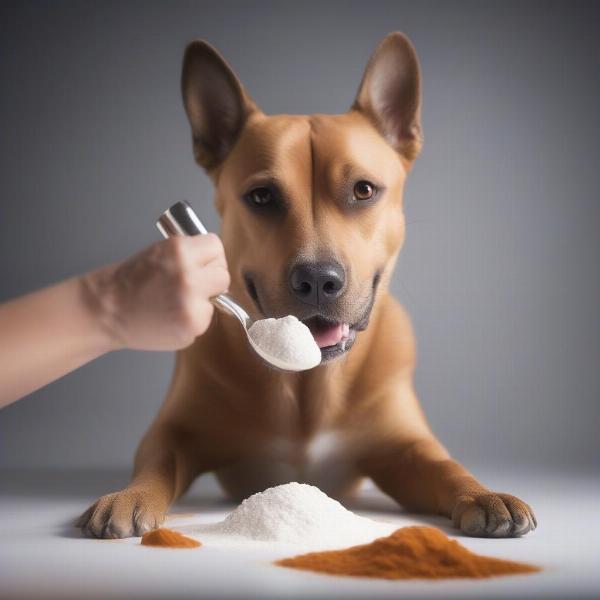Powdered supplements and medications are commonly used for dogs, offering a convenient way to address various health and wellness needs. From joint support to skin allergies, understanding the different types of powders, their benefits, and potential risks is crucial for responsible pet ownership. Choosing the right powder for your dog depends on their specific needs and should always be done in consultation with a veterinarian.
Understanding Different Types of Powders for Dogs
Powders for dogs cater to a wide range of health concerns. Some common types include:
- Nutritional Supplements: These powders can boost your dog’s diet with added vitamins, minerals, or other beneficial nutrients like pumpkin seed powder for dogs. They can be particularly helpful for picky eaters or dogs with specific dietary requirements.
- Joint Support: Powders containing glucosamine, chondroitin, and other ingredients can help maintain joint health, especially in older dogs or breeds prone to joint issues.
- Skin and Coat: Powders designed for skin and coat health can alleviate itching, reduce inflammation, and promote a healthy, shiny coat. Ingredients like omega fatty acids and cranberry powder for dogs can be particularly beneficial.
- Medication: Some medications are available in powder form, making administration easier for dogs who struggle with pills. Always follow your vet’s instructions carefully when giving your dog powdered medication.
 Dog taking powder supplements
Dog taking powder supplements
Administering Powder to Your Dog
Giving your dog powder can be straightforward, but some dogs might be resistant. Here are a few tips:
- Mix with Food: The easiest way is to mix the powder thoroughly with your dog’s wet or dry food. Ensure it’s well incorporated to prevent your dog from picking it out.
- Mix with Water: For some powders, you can mix them with a small amount of water to create a paste and then administer it directly or mix it with food.
- Use a Pill Pocket or Treat: Hiding the powder inside a pill pocket or a tasty treat can make it more appealing to your dog.
Potential Risks and Considerations
While powders can be beneficial, it’s essential to be aware of potential risks:
- Allergies: Some dogs might be allergic to certain ingredients in powders. Always introduce new powders gradually and monitor your dog for any adverse reactions.
- Dosage: Following the correct dosage is crucial. Overdosing can lead to health problems. Consult your vet for the appropriate dosage for your dog’s size, breed, and health condition.
- Interactions: Some powders can interact with other medications your dog might be taking. Inform your vet about all supplements and medications your dog is currently using.
When to Consult a Veterinarian
Always consult your veterinarian before starting your dog on any new powder, especially if they have pre-existing health conditions. Your vet can recommend the most appropriate powder based on your dog’s individual needs and health status. They can also advise on the correct dosage and monitor for any potential side effects. Don’t hesitate to reach out to your vet if you notice any unusual changes in your dog’s behavior or health after starting a new powder regimen. hotspot powder for dogs might be useful in certain situations, but always consult your vet first.
Conclusion
Powders can be a valuable addition to your dog’s health and wellness routine, providing targeted support for various needs. By understanding the different types of powders available, their benefits, and potential risks, you can make informed decisions about your dog’s care. Always consult with your veterinarian before introducing any new powder to your dog’s diet to ensure it is safe and appropriate for their individual needs. best powder green mussels for small dogs may be a great option for certain small breeds.
FAQ
- What are the common types of powders for dogs? Common types include nutritional supplements, joint support powders, skin and coat formulas, and medications.
- How do I give my dog powder? Mix the powder with their food, water, or hide it in a treat.
- Are there any risks associated with using powders for dogs? Potential risks include allergies, incorrect dosage, and interactions with other medications.
- When should I consult a vet before giving my dog powder? Always consult your vet before starting your dog on any new powder, especially if they have pre-existing health conditions.
- Can I give my dog thornit ear powder for dogs without consulting a vet? No, always consult with your veterinarian before administering any medication, including ear powders.
About ILM Dog
ILM Dog is your trusted international resource for all things dog-related. We provide expert advice on everything from breed selection and puppy care to senior dog health, training, nutrition, grooming, and product recommendations. We’re dedicated to helping dog owners worldwide provide the best possible care for their furry companions. For personalized advice or any questions, contact our team of experts at [email protected] or call us at +44 20-3965-8624. We’re here to support you and your dog every step of the way.